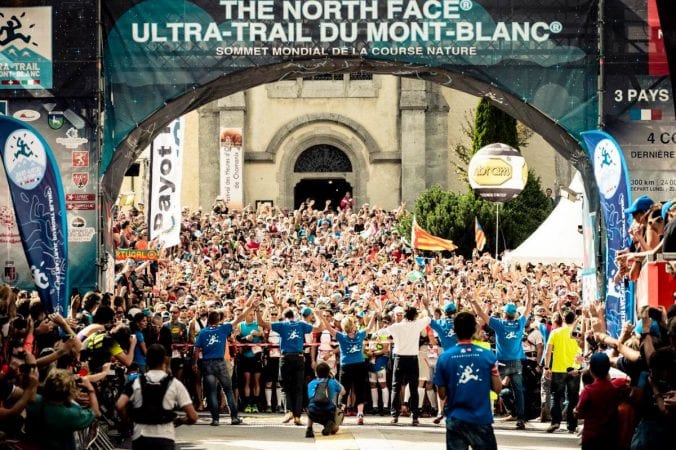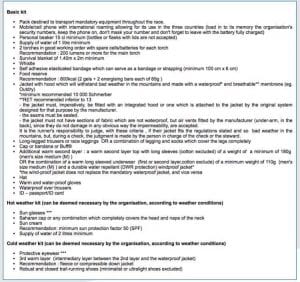Kyle Brown
For most runners, the 26.2 miles (42.2km) of a marathon is the pinnacle of running achievements. It takes months of hard work, dedications and sacrifice. But for a few extreme individuals, a marathon is only seen as a warm up.
When living back in his native Australia, Patrick Tongue had a picture of the start line to the Ultra-Trail Du Mont Blanc (UTMB) race sat on his desk. Since moving to Germany and working in Switzerland, the start line is practically a stone throw away. PACE News got chatting to him to see what exactly it takes – mentally and physically – to prepare yourself and to compete in these sort of endurance events.
The UTMB is a single stage mountain ultra marathon held annually in the Alps, with a route that takes you through France, Switzerland and Italy. With a distance of around 106 miles, it is more than four times the length of your standard marathon. And if that wasn’t challenging enough, runners also have to endure a total elevation gain of 10,040 metres (32.940 ft). It is quite rightly regarded as one of the most difficult foot races in the world.
With that in mind, you can’t just sign up and enter the race, it requires an accumulation of ‘race points’ – gained by competing in other ultra marathons recognised as challenging enough by the main event organisers. And after running in the CCC (Courmayeur Champex Charmonix) for the second straight year, Pat now has what it takes to compete in the UTMB and fulfil a lifelong ambition.
The CCC is a shorter, sister race of the UTMB, overlapping with much of the same course but is only 101km long. Not many events come with a mandatory gear list as long as this:
In its own right, the CCC could be the ultimate goal for some people. It would strike fear and nervousness into the minds of any seasoned runner. But for Pat, it’s just a stepping stone to his lifelong ambition.
After running it again this year, Pat had this to say:
“Last year, my finishing time for the CCC was around 16 hours, my goal this year was to significantly decrease this time and be competitive in the process. Unfortunately, things did not go to plan and due to illness, I had to call it a day at around 80km after not taking in any food or liquid for a number of hours. After building up to this race for a few months it was disappointing, however, there are always future races.
“I am lucky enough to have enough qualifying points to enter the 101km race again next year. I am thinking of entering the shorter, faster 58km version of the race in the meantime- starting in Orsières and finishing in Chamonix.”
Running for 80km straight and still not being deemed a ‘finisher’ would be unthinkable to most standard race runners, but despite the setback, Pat continues to soldier on.
The gruelling length of these events can’t be underestimated; it would require some cars to stop for fuel along the way. So as you can imagine, training isn’t optional, it’s vital for survival. Any spare time Pat finds himself with is often spent running:
“A lot of sleep is lost due to early morning training sessions starting at 5am to log enough kilometres before work. On weekends, I would try to get to the Alps to run between 4-7hours and work on climbing.”
Despite training being often the length of a full working day, nothing can truly prepare you mentally for what goes on during a race – no two races will ever be the same. ‘The Wall’ is a well-known expression among runners, whether they are amateurs or professionals.
It’s a sensation of fatigue runner’s experience, normally towards the end of a race, where they feel both mentally and physically unable to carry on, even if the finishing line is within reach. So as any runner can appreciate, it is horrendously difficult overcoming it during a race…but what if the race was so long you had to do it more than just once?
“The thing about ultra-running is that you may hit the wall multiple times in a race. It’s usually due to lack of appropriate fuelling during the race. It’s your body’s response to having no carbohydrate left and therefore, it starts using fat as a fuel. The best way to overcome it is to eat!”
As tough mentally as it is physically, that’s what entices Pat to compete at these events:
“The mental aspect of this kind of distance running is what draws me in the most; I have always wanted to see how far I can push my mind as that’s what usually goes first. During the race it is common to have multiple lows, it’s important to just keep moving forward as best you can.”
Entering an ultra marathon is a remarkable achievement, let alone finishing it. Your body can take weeks to recover and mentally it may be something you can never think of putting yourself through again. Naturally, upon completion, it’s cause for celebration. And what does Pat think is the best way to celebrate? (Given the fact he spends his spare time at weekends running, this answer probably won’t surprise you)!
“Usually I celebrate by planning my next adventure. I have already been back training for shorter distance races over the coming months and will commence full-training again in January as I prepare to run the London Marathon for the second time.”
One thing is clear. Pat is part of a rare breed of humankind that have the required mental toughness and physical capabilities to push their bodies to such extremes. After chatting with him, it was abundantly clear that there is no real ‘finishing line’ for him. Even if he completes the UTMB next year and can ‘tick off’ one of his life goals, he’ll have his eyes set on another, undoubtedly more challenging race to stride towards.





Leave a Reply